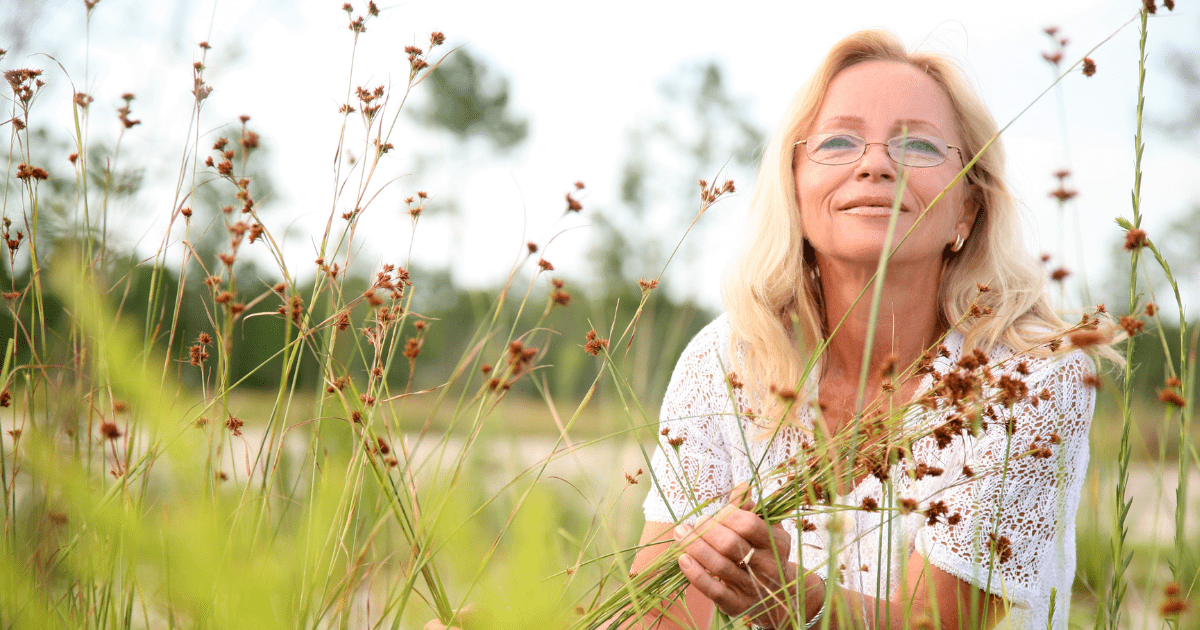Menopause, a natural phase in a woman’s life, signifies the end of her reproductive years. It typically occurs between the ages of 45 and 55 and can bring significant changes and challenges — especially during the hot summer months. Addressing menopause symptoms in the summertime is key to maintaining comfort and overall well-being.
Let’s explore the impact of menopause during the hot summer months along with research-based tips and strategies to effectively manage symptoms and enhance your well-being during this transformative phase.
Is Menopause Worse During the Summer
During menopause, hormonal fluctuations impact the body’s ability to regulate temperature, making women more sensitive to external heat. Hot flashes, one of the most common symptoms, can become more frequent and intense in warm weather, affecting daily activities and quality of life.
Handling the challenges of menopause when intensified by the summer season means developing effective strategies to manage symptoms. Focusing on staying cool, managing hot flashes, maintaining overall well-being and seeking appropriate support are crucial. Below, you’ll find practical tips and insights to navigate menopause during the hot summer months.
How to Keep Cool When Experiencing Menopause in the Summer
Dress for the Heat
Choose lightweight and breathable fabrics such as cotton or linen to allow air circulation and help wick away sweat. Opt for loose-fitting clothes for better ventilation and regulation of body temperature.
Manage Body Temperature
Use cooling aids such as fans, ice packs or cooling towels to help lower body temperature. Seek air-conditioned areas as much as possible, especially during the hottest parts of the day. Take cool showers or baths to help cool down and relieve discomfort.
Create a Cool Sleep Environment
Use breathable bedding and sleepwear made from natural fibers to promote airflow and reduce night sweats, and use fans or air conditioning in the bedroom to maintain a comfortable sleeping temperature.
Hydrate
Stay adequately hydrated by drinking plenty of water throughout the day. Dehydration can intensify menopause symptoms, making it harder to regulate body temperature. Avoid excessive caffeinated or alcoholic beverages, as they can contribute to dehydration.
Protect Yourself from the Sun
Protect yourself from the sun’s harmful rays by wearing a wide-brimmed hat and sunglasses and applying sunscreen with a high SPF. Excessive sun exposure can trigger hot flashes and increase discomfort.
Seek Shade and Cool Down
When outdoors, seek shaded areas to escape direct sunlight and take breaks in air-conditioned spaces whenever possible. Carry a portable handheld fan or use a misting spray to cool down when needed.
Time Outdoor Activities
Plan outdoor activities during the early morning or evening to avoid extreme heat, which can help minimize discomfort and reduce the risk of overheating.
Maintain Optimal Indoor Temperatures
Maintain a comfortable room temperature by adjusting your thermostat or using fans to circulate air. Finding the right balance between coolness and avoiding excessive cold can promote better comfort.
By implementing these strategies, women can better manage the challenges of menopause during the hot summer months. Staying cool and comfortable is vital to minimizing the impact of menopause symptoms and maintaining a good quality of life.
 How to Manage Hot Flashes in the Summer
How to Manage Hot Flashes in the Summer
Hot flashes are a common and bothersome symptom experienced during menopause, so understanding what hot flashes are and identifying their triggers can help women effectively manage them, especially during the hot summer months.
Hot flashes are sudden, intense sensations of heat that can cause flushing of the face, neck and chest, followed by excessive sweating. A Study of Women’s Health Across the Nation surveyed 959 women in 10 years and recorded that hot flashes, night sweats and sleep problems peak during summer. By recognizing these triggers, women can take proactive steps to reduce the frequency and intensity of hot flashes during the summer.
Coping strategies for managing hot flashes during the summer include:
Stay Hydrated
Drink plenty of water throughout the day to stay well-hydrated since dehydration can worsen hot flashes.
Avoid Triggers
Identify and avoid triggers for hot flashes, such as spicy foods, caffeine and alcohol. Opt for cooler beverages and milder food options to minimize the likelihood of triggering a hot flash.
Use Portable Fans
Carry a small handheld fan or use battery-operated fans to create a cooling breeze when there’s a sudden heat episode. These portable fans can provide instant relief and help regulate body temperature.
Practice Relaxation Techniques
Practice deep breathing exercises, meditation or progressive muscle relaxation to reduce stress. Anxiety can contribute to the intensity of heat sensation, so incorporating relaxation techniques into daily routines can provide comfort.
How to Maintain Overall Well-being in the Summer During Menopause
Maintaining overall well-being during menopause is crucial for a smoother transition. Here are some key areas to focus on:
Stay Physically Active
Regular exercise is beneficial for managing menopause symptoms, improving mood and maintaining overall health. Engage in activities you enjoy, such as walking, swimming or yoga. Choose cooler times of the day for outdoor activities, or consider indoor exercises to avoid excessive heat.
A study in the Journal of the North American Menopause Society found that postmenopausal women who walked daily reported that their life satisfaction rates were higher compared to those who were less active or those who didn’t walk at all. Physically active participants also reported lesser symptoms of anxiety and depression compared to others.
Another study published in the same journal highlighted the effects of walking as a therapy. Out of the 77 different walking intervention programs, 91% were reported to have a positive effect on at least one menopause-related issue.
Finally, the study Menopause, Physical Activity and Mental WellBeing by the University of Edinburgh reported that 57% of women in this stage decreased their physical activity, negatively affecting their mood, well-being and confidence. In contrast, those who met the physical activity requirements had greater mental well-being. This research highlighted menopause-friendly exercises, so it is best to ask an expert to guide you on what activities fit your situation.
Eat a Healthy Diet
Prioritize a well-balanced diet that includes hydrating foods like fruits and vegetables. These foods can help regulate body temperature and provide essential nutrients. Additionally, include calcium-rich foods like dairy products or leafy greens and foods rich in vitamin D to support bone health.
Research published in the American Journal of Clinical Nutrition discovered that women who actively followed a low-fat diet and consumed high amounts of whole grains, fruit, and vegetables experienced a greater likelihood of reducing or eliminating hot flashes.
Manage Stress and Get Enough Rest
Menopause can be accompanied by increased stress and sleep disturbances. Practice stress-reducing techniques like deep breathing, mindfulness or engaging in hobbies that bring joy. Prioritize quality sleep by creating a relaxing bedtime routine and ensuring a comfortable sleep environment. A study in the Journal of Environmental and Public Health documented that positive psychological well-being, along with exercise, lowered menopausal symptoms among middle-aged women.
 Where to Find Menopause Support
Where to Find Menopause Support
Navigating menopause can be easier with the support of others who are going through a similar experience. Consider the following options:
Join Menopause Support Groups or Online Communities
Sharing experiences and connecting with other women who go through menopause can provide comfort, guidance and a sense of community. These groups can offer valuable insights and support during this phase.
The Effect of Support Group Method on Quality of Life in Post-menopausal Women study concluded that joining a community-based support group improved the quality of life of the participants. While the Development of Social Support Model to Reduce Menopause Women’s Anxiety research stressed that quality social relationships reduced anxiety in participants.
Consult with Healthcare Professionals
It’s important to discuss your menopause symptoms and concerns with a healthcare professional. They can provide personalized advice and discuss hormone therapy options, alternative treatments and complementary therapies that may suit your specific needs.
Consult KC Wellness
If you seek personalized guidance and support for managing your menopause journey, consider consulting KC Wellness. Our team of experienced healthcare professionals specializes in women’s health and can provide expert advice tailored to your situation.
At KC Wellness, we understand that every woman’s experience with menopause is unique. Our dedicated experts will take the time to listen to your concerns, evaluate your symptoms and create a personalized treatment plan that suits your individual needs and preferences.
By partnering with KC Wellness, you’ll gain access to a comprehensive range of services designed to support you throughout your menopause transition. Our holistic approach combines evidence-based medical care with a focus on overall well-being.
Whether you need assistance with symptom management, hormone therapy, lifestyle modifications or exploring complementary therapies, our team will guide you through the available options. We are here to help you make informed decisions about your health.
Don’t face menopause alone. Contact our team today to schedule a consultation and take the first step towards a healthier, happier menopause experience. Check all of our services.

Dr. Rahul Kapur, M.D. is a board-certified family medicine physician with a dedicated passion for integrative medicine and a deep knowledge of functional medicine. He was named intern of the year at Wesley Medical Center in Wichita, KS, and has been practicing as a hospitalist for over a decade. He has successfully helped many patients in Kansas City with his specialized IV bags, ketamine therapy, hormone optimization and weight loss therapy methods.


 How to Manage Hot Flashes in the Summer
How to Manage Hot Flashes in the Summer Where to Find Menopause Support
Where to Find Menopause Support